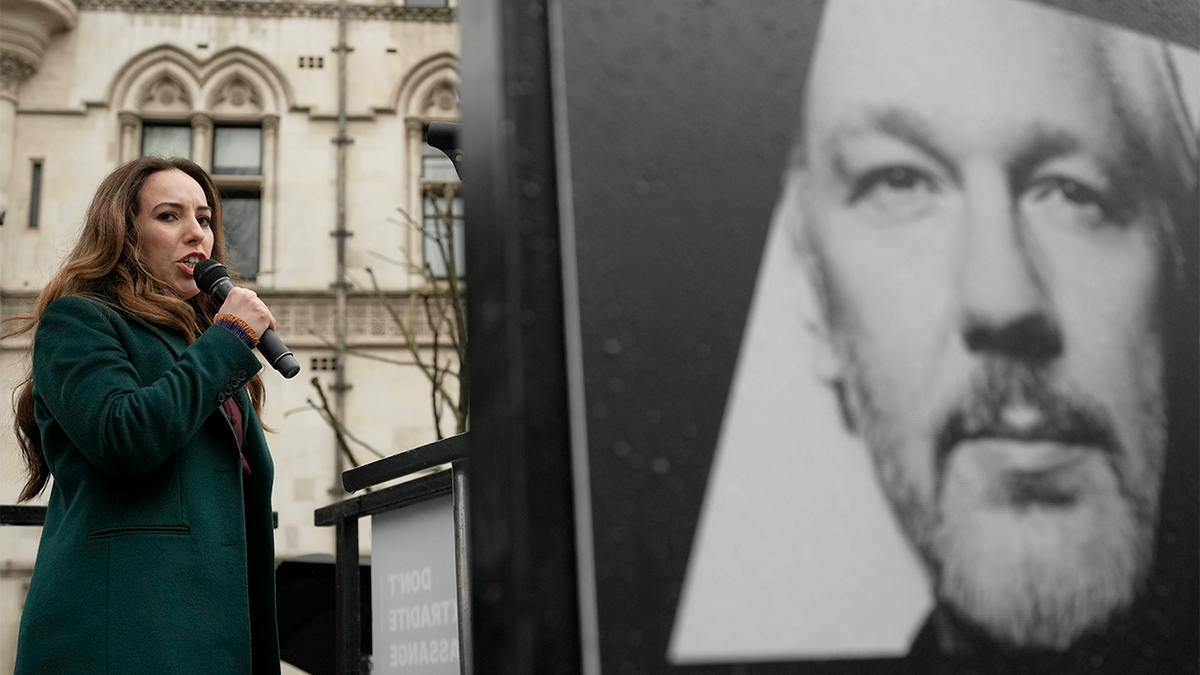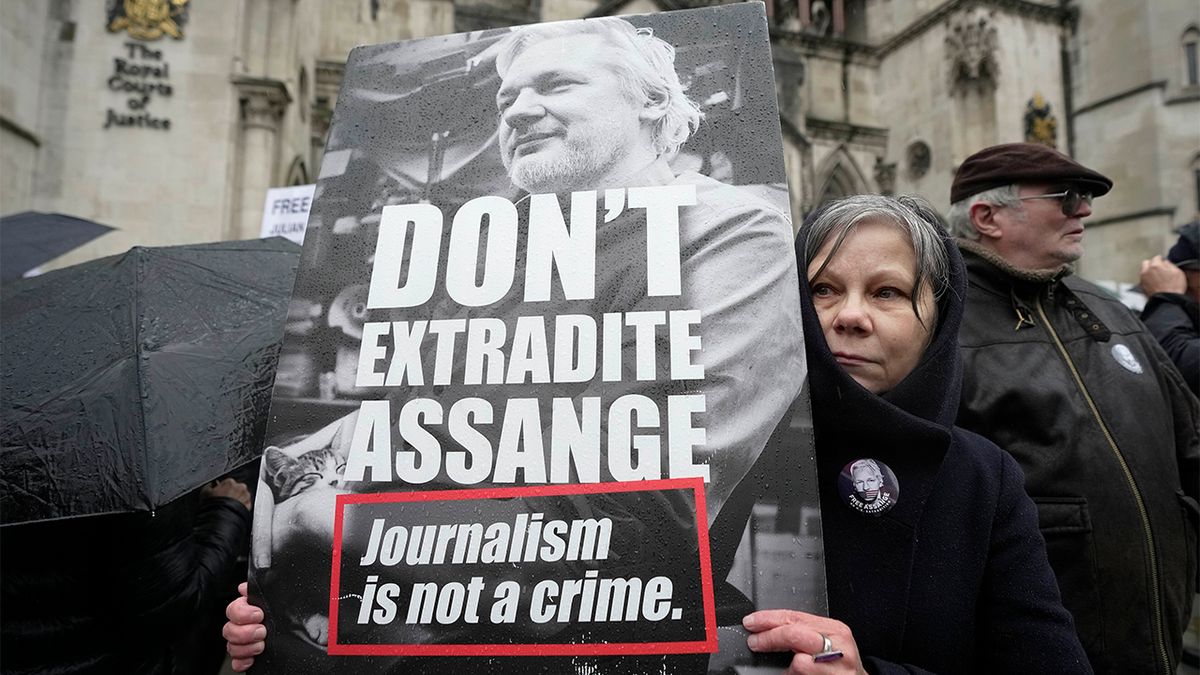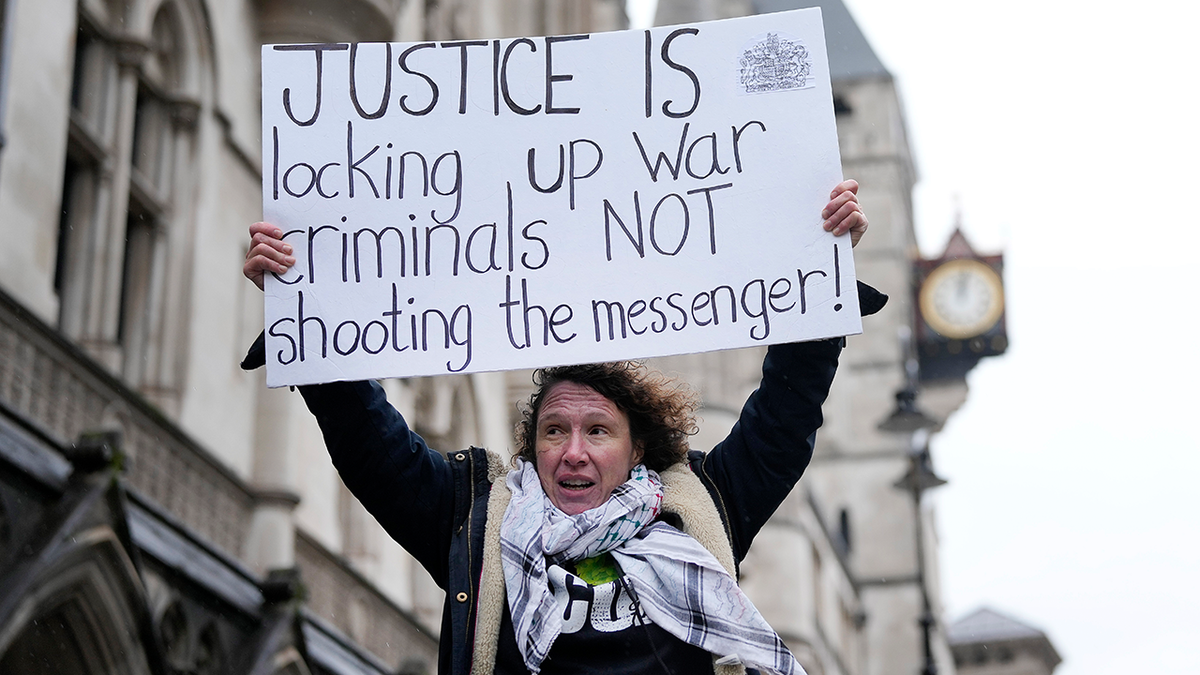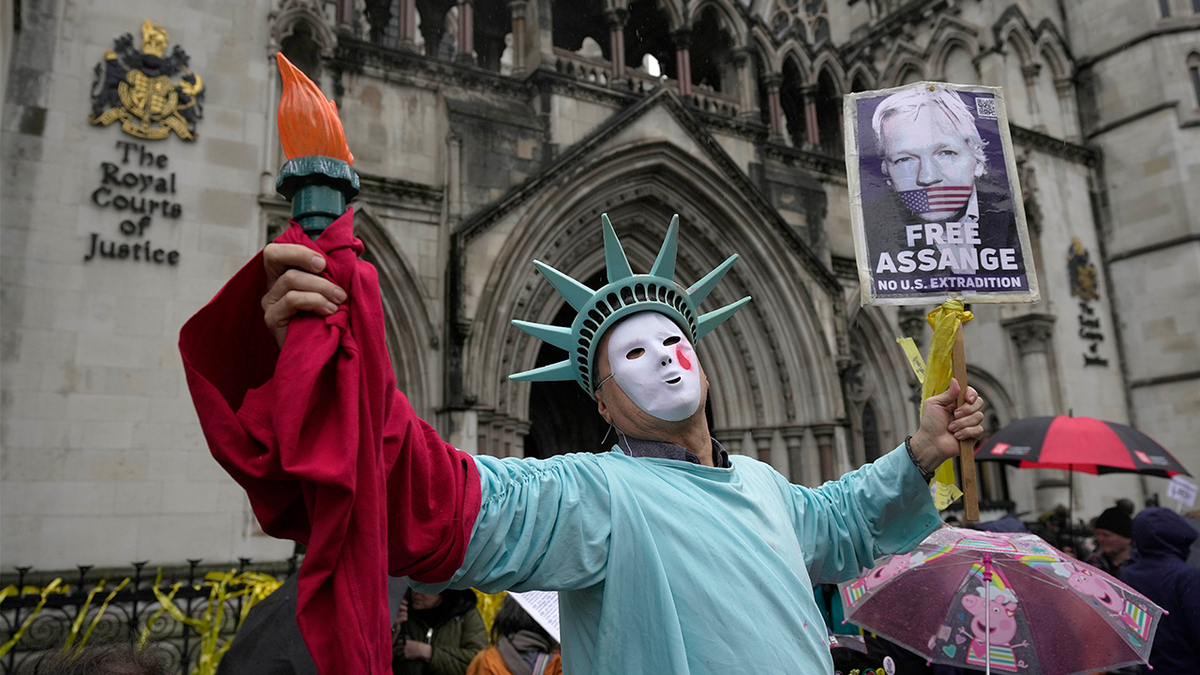Julian Assange's wife say U.S. extradition case is an 'attack on truth'
Julian Assange's wife, Stella, said the prosecution of her husband is an "attack on truth." (via Reuters)
WikiLeaks founder Julian Assange's hearing at the British High Court in London for his possible final appeal challenging his extradition to the U.S. concluded on Wednesday. The court is not expected to make a decision on the Australian publisher's fate until at least next month.
The two-day appeal hearing before a panel of two judges wrapped up after U.S. lawyers delivered arguments, as they seek to have Assange, 52, sent to the U.S. to face espionage charges for publishing classified U.S. military documents 14 years ago.
Lawyer Clair Dobbin, representing the U.S. government, claimed the case is based on "law, on evidence" and "not political inspiration," pushing back on accusations that Assange's prosecution is politically motivated.
"Julian is a political prisoner, and he has to be released," Assange's wife, Stella, said in a speech outside the court.

Stella Assange, wife of Julian Assange, speaks besides a poster of Julian Assange at the Royal Courts of Justice in London, Wednesday, Feb. 21, 2024. (AP)
The judges overseeing the case, Victoria Sharp and Jeremy Johnson, said Wednesday they would take time to come to a verdict, and a ruling on Assange's fate is not expected until March at the earliest.
While the hearing could be Assange's final appeal attempting to block his extradition to the U.S., a full appeal hearing could come in the future if he wins in court this week. If he loses this appeal, Assange's only remaining option would be at the European Court of Human Rights, but his supporters fear he could be flown to the U.S. before that happens because the British government has already signed an extradition order.
Dobbin purported that Assange put innocent lives at risk and went beyond journalism in his efforts to obtain and publish classified U.S. government documents. She claims Assange encouraged and helped U.S. Army intelligence analyst Chelsea Manning steal diplomatic cables and military files that WikiLeaks published, and that doing so jeopardized lives.
But there is no evidence that WikiLeaks put anyone in danger by publishing the documents. It is also a common practice among journalists to ask a source to provide more material.
Dobbin claimed that Assange damaged U.S. security and intelligence services and "created a grave and imminent risk" by publishing hundreds of thousands of documents. She said these risks could harm and lead to the arbitrary detention of innocent people, including many who lived in war zones or under repressive regimes.
She said Assange encouraging Manning and others to hack into government computers and steal material meant that the WikiLeaks founder was "going a very considerable way beyond" a journalist gathering information.
Assange was "not someone who has just set up an online box to which people can provide classified information," she said. "The allegations are that he sought to encourage theft and hacking that would benefit WikiLeaks."
Lawyers for Assange argued during day one of the hearing on Tuesday that U.S. authorities are seeking to punish him for WikiLeaks' "exposure of criminality on the part of the U.S. government on an unprecedented scale," including torture and killings.
If he is extradited to the U.S., lawyer Edward Fitzgerald warned, there is "a real risk he may suffer a flagrant denial of justice."

Julian Assange's lawyers are on their final U.K. legal challenge to stop the WikiLeaks founder from being sent to the U.S. to face spying charges. (AP)
Dobbin said the First Amendment does not grant immunity to journalists who break the law and that media outlets that went through the process of redacting the documents before publishing them are not being prosecuted.
Journalists located outside of England and Wales, including from Fox News Digital, were denied access to observe the hearing remotely. Journalists who were permitted access, either remotely or in person, had trouble at times hearing lawyers during Wednesday's arguments.
Should he be extradited to the U.S. after exhausting all his legal appeals, Assange would face trial in Alexandria, Virginia, and could be sentenced to up to 175 years in an American maximum-security prison. His supporters have long argued that he would not receive a fair trial if he is extradited.
"We've essentially heard nothing new from the U.S. government's legal representation in this hearing," international nonprofit Reporters Without Borders said in a statement Wednesday. "Rather than addressing the compelling new arguments made by Assange’s defence, they have doubled down on their longstanding claims that Assange’s actions do not qualify as journalistic activity and that he will be given a fair trial in the U.S."
"The facts of the matter remain: the publication by WikiLeaks in 2010 of the leaked classified documents exposed information that was in the public interest and informed journalism around the world," the statement continued. "The prosecutor and other US officials have stated that as a foreign national, Assange will not be afforded First Amendment protections. Combined with the fact that the Espionage Act has no public interest defence, that means he cannot get a fair trial."
Assange was absent from court on Tuesday and Wednesday because of health issues. His family has raised concerns about his physical and mental health, with Stella Assange telling reporters that her husband's life is at risk every day he remains in prison and that she believes he will die if he's extradited to the U.S.
Earlier this month, U.N. Special Rapporteur on Torture, Alice Jill Edwards, called on the U.K. government to halt the possible extradition of Assange over concerns that he would be at risk of treatment amounting to torture or other forms of ill-treatment or punishment.
BIPARTISAN CONGRESSIONAL RESOLUTION CALLS ON US OFFICIALS TO DROP CHARGES AGAINST ASSANGE
Last month, a group of Australian lawmakers wrote a letter to U.K. Home Secretary James Cleverly demanding Assange's U.S. extradition be halted over concerns about his safety and well-being, urging the U.K. government to instead make an independent assessment of Assange's risk of persecution.
Assange is facing 17 charges for allegedly receiving, possessing and communicating classified information to the public under the Espionage Act, and one charge alleging a conspiracy to commit computer intrusion.
The charges were brought by the Trump administration's Justice Department over WikiLeaks' 2010 publication of cables leaked by Manning detailing war crimes committed by the U.S. government in Iraq, Afghanistan and the Guantánamo Bay, Cuba, detention camp. The materials also exposed instances of the CIA engaging in torture and rendition.
WikiLeaks' "Collateral Murder" video showing the U.S. military gunning down civilians in Iraq, including two Reuters journalists, was also published 14 years ago.
Assange has been held at London's high-security Belmarsh Prison since he was removed from the Ecuadorian Embassy on April 11, 2019, for breaching bail conditions. He had sought asylum at the embassy since 2012 to avoid being sent to Sweden over allegations he raped two women because Sweden would not provide assurances it would protect him from extradition to the U.S. The investigations into the sexual assault allegations were eventually dropped.

A protester holds a poster at the Royal Courts of Justice in London, Wednesday, Feb. 21, 2024. (AP)
A U.K. District Judge rejected the U.S. extradition request in 2021 on the grounds that Assange was likely to kill himself if he was held under harsh U.S. prison conditions. Higher courts later overturned that decision after receiving assurances from the U.S. about his treatment, and the British government signed an extradition order in June 2022.
One of Assange's lawyers, Mark Summers, said Tuesday there was evidence showing that there had been a plan to kidnap or murder Assange while he was in the Ecuadorean Embassy and former President Trump had requested "detailed options" to kill him.
"Senior CIA officials requested plans, the president himself requested on being provided with options on how to do it and sketches were even drawn up," Summers said.
The CIA under the Trump administration allegedly had plans to kill Assange over the publication of sensitive agency hacking tools known as "Vault 7," which were leaked to WikiLeaks, Yahoo reported in 2021. The agency said the leak represented "the largest data loss in CIA history."
The agency was accused of having discussions "at the highest levels" of the administration about plans to assassinate Assange in London and allegedly followed orders from then-CIA director Mike Pompeo to draw up kill "sketches" and "options." The CIA also had advanced plans to kidnap and rendition Assange, and had made a political decision to charge him, according to the Yahoo report.
While he was in the embassy, the CIA was exposed for spying on Assange and his lawyers. A judge recently ruled that a lawsuit brought against the CIA for spying on his visitors can move forward.
"They're putting Julian into the hands of the country and of the people who plotted his assassination," Stella Assange said.
The Obama administration in 2013 decided not to indict Assange over WikiLeaks' 2010 publication of classified cables because it would have had to also indict journalists from major news outlets who published the same materials, which has been described as "The New York Times problem." Former President Obama also commuted Manning’s 35-year sentence for violations of the Espionage Act and other offenses to seven years in January 2017, and Manning, who had been imprisoned since 2010, was released later that year.
But the Justice Department under former President Trump later moved to indict Assange under the Espionage Act, and the Biden administration has continued to pursue his prosecution.
UK HIGH COURT SETS DATE FOR JULIAN ASSANGE'S FINAL APPEAL CHALLENGING US EXTRADITION

Assange has been fighting extradition for more than a decade, including seven years in self-exile in the Ecuadorian Embassy in London and the last five years in a high-security prison. (AP)
No publisher had been charged under the Espionage Act until Assange, and many press freedom groups have said his prosecution sets a dangerous precedent intended to criminalize journalism.
In 2022, the editors and publishers of U.S. and European outlets that worked with Assange on the publication of excerpts from the more than 250,000 documents he obtained in the Cablegate leak – The Guardian, The New York Times, Le Monde, Der Spiegel and El País – wrote an open letter calling for the U.S. to drop the charges against Assange.
CLICK HERE TO GET THE FOX NEWS APP
An editor for The Guardian also published an editorial on Sunday saying that the outlet opposes Assange's U.S. extradition because doing so would be a threat to both the WikiLeaks founder and journalism.
There have also been multiple efforts made by lawmakers in the U.S. and Australia in the last year to demand Assange's freedom, including a vote last week in which the Australian Parliament overwhelmingly supported calling on the U.S. and U.K. Governments to end Assange's prosecution and a resolution introduced last month in the U.S. House calling for him to be released.
The Associated Press contributed to this report.






















